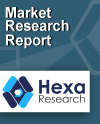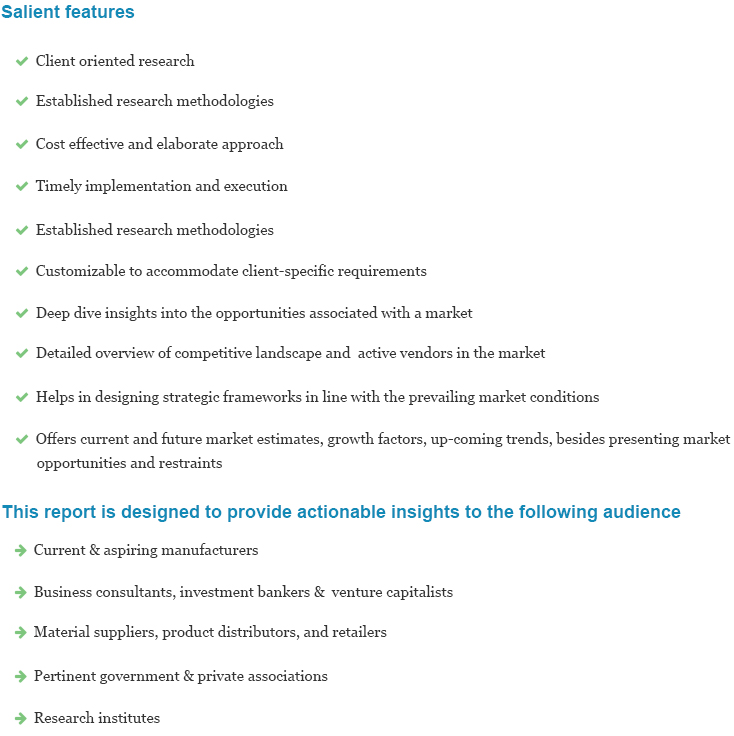
Aquafeed Market Size By Application (Carp, Mollusks, Salmon, Crustaceans, Tilapia, Catfish) & Aquaculture Additives Market Size by Product (Amino Acids, Antibiotics, Vitamins, Feed Acidifiers), Competitive Analysis & Forecast, 2012 - 2022
- Published: December, 2015
- Format: Electronic (PDF)
- Number of pages: 102
- Industry: Food & Beverages
Industry Overview
Global aquafeed market size is expected to reach 96.3 million tons by 2022, growing at a CAGR of 11.1% from 2015 to 2022. Global aquafeed additives market size is likely to be worth USD 1.2 billion by 2022.
Increase in fish demand for direct human consumption (DHC) as well as non-DHC applications is anticipated to drive aquaculture market growth. Rising awareness among breeders regarding the benefits of feed for aquaculture is anticipated to drive aquafeed market over the forecast period.
Direct human consumption of fish was 136.00 million tons in 2012 and is anticipated to reach 205.81 million tons by 2022, growing at a CAGR of 4.3% between 2015 and 2022. At present, over 75% of the global fish harvested is used for DHC as food. Increasing per-capita middle class disposable income coupled with rising nutritional standards is expected to propel direct human consumption of fish over the forecast period. This factor is anticipated to drive aquaculture market growth.
Rising prevalence of obesity, cardiovascular diseases and other illnesses including diabetes is anticipated to augment demand for omega-3 supplements over the forecast period. Omega-3 fatty acids are obtained from a variety of fish including tuna, salmon, whale blubber, cod liver and seal blubber
Global consumer spending on EPA/DHA omega-3 products was over USD 25 billion in 2011. Infant formula was the largest segment for which consumers across the globe spent over USD 10 billion, followed by fortified food & beverages which accounted for approximately USD 8 billion. Rising consumer demand regarding the benefits of EPA/DHA in regular diet is anticipated to subsequently have a positive impact on aquafeed market over the forecast period.
Application Overview
Carp dominated the application segment for aquafeed market with a revenue generation exceeding USD 19 billion in 2014. It is anticipated to be the fastest growing application segment over the forecast. Increasing importance of omega-3 fatty acids in food & beverage industry owing to importance of reducing cholesterol levels is expected to increase the farming activities meant for carps.
Mollusks accounted for more than 20% of the total volume in 2014 and are expected to grow at significant growth rates of over 11% from 2015 to 2022. Mollusk, which includes oysters and clams, contains important nutrients & offer health benefits to humans. They are also used as filter feeders for water quality applications by filtering contaminants, sediments and nutrients. Increasing application scope of mollusks in agriculture and DHC is expected to drive aquaculture farming and thus result in promoting aquafeed industry growth.
Product Overview
Amino acids emerged as the dominant product segment for aquafeed additives market with revenue exceeding USD 200 million in 2014. Increasing importance of amino acids to improve efficiency of protein utilization in animal feeding is expected to be a favorable factor for industry growth. Lysine, methionine, threonine, and tryptophan are some product forms of amino acids used as additive in aquaculture. Stringent regulations of European Commission, aimed at promoting the use of plant-based growth regulators in animal feed industry are expected to fuel amino acids demand in the near future.
Antibiotics product segment accounted for more than 20% of aquafeed additives market in 2014 and is expected to below average growth rates with an estimated CAGR of over 3% from 2015 to 2022.
Antibiotics overdose result in creation of antibiotic resistant bacteria, which induce change in DNA sequence of bacteria and allow its survival from any further treatment. U.S. FDA imposed ban on numerous antibiotics including malachite green, chloramphenicol, gentian violet and nitrofuran on account of inducing water contamination. As a result, antibiotics demand as an aquafeed additive is expected to be hampered over the next seven years.
Regional Overview
Asia Pacific was the largest region for aquaculture and aquafeed, with valuation exceeding USD 40 billion for aquafeed industry in 2014. Predominant aquaculture production in the region, particularly in China coupled with growing inclination towards salmon farming owing to factors such as hardiness of the species, ease of farming, better water quality within closed farm systems, and government interest is expected to fuel aquafeed demand in the near future. Asia Pacific is also expected to be the fastest growing region.
Europe was the second largest region in terms of demand and accounted for more than 13% of the total volume in 2014. Growing popularity of mussels as source of low-cost protein in Europe along with its production base in Western Europe is expected to drive aquafeed industry growth.
Competitive Market Share
The global aquafeed additives market share is fragmented with large companies present across the value chain. Key companies include Biomar, Altech, Inc.Ridley, Dibaq Aquaculture, Aller Aqua, Biomin and Addcon Group GmbH.

Choose License Type
- World's largest premium report database
- Transparent pre & post sale customer engagement model
- Unparalleled flexibility in terms of rendering services
- Safe & secure web experience
- 24*5 Research support service
